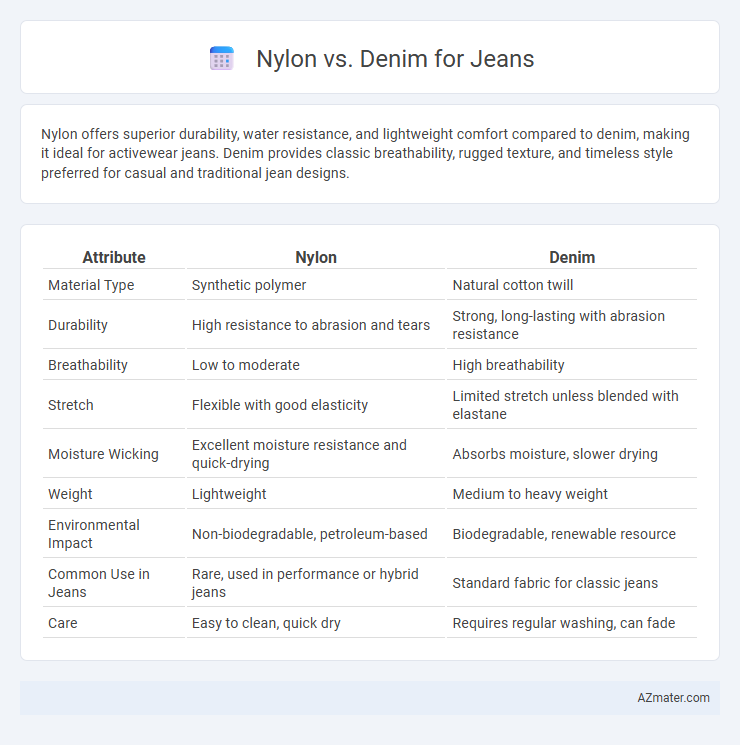Nylon offers superior durability, water resistance, and lightweight comfort compared to denim, making it ideal for activewear jeans. Denim provides classic breathability, rugged texture, and timeless style preferred for casual and traditional jean designs.
Table of Comparison
| Attribute | Nylon | Denim |
|---|---|---|
| Material Type | Synthetic polymer | Natural cotton twill |
| Durability | High resistance to abrasion and tears | Strong, long-lasting with abrasion resistance |
| Breathability | Low to moderate | High breathability |
| Stretch | Flexible with good elasticity | Limited stretch unless blended with elastane |
| Moisture Wicking | Excellent moisture resistance and quick-drying | Absorbs moisture, slower drying |
| Weight | Lightweight | Medium to heavy weight |
| Environmental Impact | Non-biodegradable, petroleum-based | Biodegradable, renewable resource |
| Common Use in Jeans | Rare, used in performance or hybrid jeans | Standard fabric for classic jeans |
| Care | Easy to clean, quick dry | Requires regular washing, can fade |
Introduction: Nylon vs Denim Jeans
Nylon and denim are two distinct fabrics widely used in jean manufacturing, each offering unique characteristics. Denim, a durable cotton twill textile, is renowned for its rugged texture and classic look, commonly preferred for traditional jeans. Nylon provides a lightweight, stretchable alternative, enhancing comfort and flexibility while maintaining resilience in modern jean designs.
Material Composition: What Sets Nylon and Denim Apart
Nylon is a synthetic polymer made from polyamide fibers, known for its elasticity, durability, and resistance to abrasion and moisture, making it lightweight and quick-drying. Denim, traditionally composed of 100% cotton, features a twill weave that provides strength, breathability, and a distinct texture ideal for rugged wear. The material composition difference drives their performance: nylon offers enhanced stretch and weather resistance, while denim delivers comfort, durability, and timeless style.
Durability Comparison: Nylon Jeans vs Denim Jeans
Nylon jeans offer superior resistance to abrasion and tearing compared to traditional denim jeans, making them ideal for high-intensity activities and rough environments. Denim jeans, crafted from cotton twill fabric, exhibit strong durability but tend to weaken and fade with frequent washing and heavy wear. The synthetic composition of nylon enhances water resistance and quicker drying times, further extending the lifespan of nylon jeans versus classic denim.
Comfort and Wearability: Which Feels Better?
Nylon offers superior flexibility and moisture-wicking properties, resulting in enhanced comfort and breathability for jeans compared to denim. Denim, typically made from cotton, provides durability and a classic texture but can feel heavier and less forgiving during extended wear. For those prioritizing softness and stretch in their jeans, nylon blends generally feel better, while denim remains favored for its rugged wearability and traditional appeal.
Style and Appearance: Aesthetic Differences
Nylon jeans offer a sleek, smooth texture with a subtle sheen that enhances a modern, sporty aesthetic, contrasting the rugged and matte finish characteristic of traditional denim. Denim's classic indigo hues and visible twill weave create a timeless, distressed look often associated with casual, vintage, or workwear styles. The drape and fit of nylon fabric allow for sharper silhouettes and vibrant color retention, while denim provides a structured, worn-in appearance that evolves with wear.
Breathability and Moisture Management
Nylon in jeans offers superior breathability due to its lightweight synthetic fibers, allowing better air circulation and faster drying compared to Denim's heavier cotton construction. Denim tends to retain moisture longer, leading to reduced comfort in humid conditions, while Nylon's moisture-wicking properties efficiently draw sweat away from the skin, enhancing overall moisture management. Choosing Nylon for jeans improves ventilation and keeps the wearer drier, making it ideal for active or warm-weather use.
Maintenance and Care Requirements
Nylon jeans require minimal maintenance due to their resistance to stains, wrinkles, and mildew, making them easy to clean with cold water and mild detergent. Denim jeans demand more care, including washing inside out in cold water to preserve color and texture, and avoiding over-washing to prevent fading and fabric wear. Both fabrics benefit from air drying to maintain longevity, but denim often needs occasional ironing, unlike nylon which is typically wrinkle-resistant.
Environmental Impact: Sustainable Choices
Nylon production relies heavily on fossil fuels and generates significant greenhouse gas emissions, while denim production consumes vast amounts of water and often involves toxic dyes harmful to ecosystems. Choosing recycled nylon or organic cotton denim with eco-friendly dyes significantly reduces environmental footprints and supports sustainable fashion practices. Prioritizing brands that implement closed-loop manufacturing and water-saving technologies enhances the sustainability of jean materials.
Cost Analysis: Price Differences Explained
Nylon and denim jeans differ significantly in cost due to material expenses and manufacturing processes, with nylon generally priced higher because of its synthetic polymer production and advanced weaving techniques. Denim, made from cotton fibers, benefits from large-scale cultivation and traditional manufacturing, resulting in lower production costs and more affordable retail prices. The price gap also reflects durability and performance features, where nylon's water resistance and lightweight nature justify premium pricing compared to denim's classic, breathable comfort.
Best Uses: Choosing the Right Fabric for Your Jeans
Nylon offers superior stretch, lightweight comfort, and moisture-wicking properties, making it ideal for activewear and performance jeans designed for outdoor activities or sports. Denim, with its thick cotton weave and durability, excels in casual, everyday wear where ruggedness and classic style are prioritized. For functional workwear or fashion staples, denim provides resilience, while nylon-enhanced blends enhance flexibility and breathability in modern, movement-focused jeans.

Infographic: Nylon vs Denim for Jean
 azmater.com
azmater.com